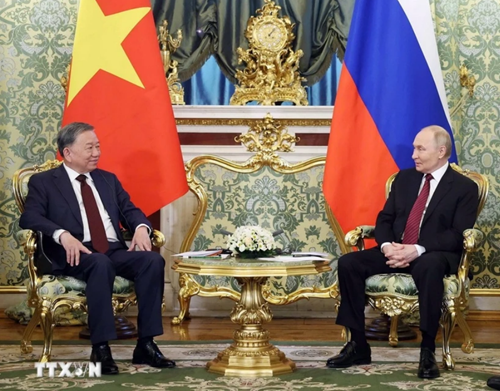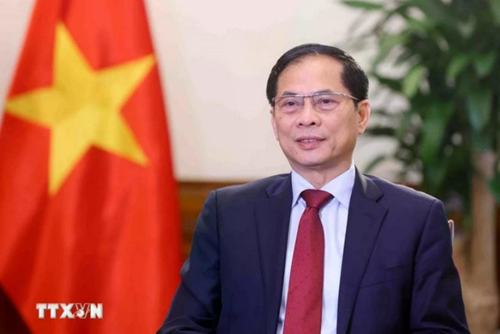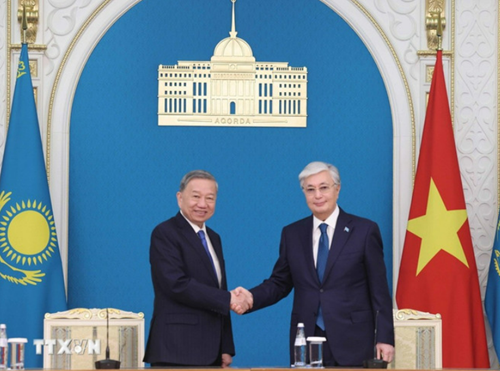The Party leader paid state visits to Kazakhstan and Azerbaijan, an official visit to Russia during which he also attended a celebration of the 80th anniversary of the Victory in the Great Patriotic War, and then a state visit to Belarus at the invitation of Kazakh President Kassym-Jomart Tokayev, Azerbaijani President Inham Aliyev, Russian President Vladimir Putin, and Belarusian President Aleksandr Lukashenko.
Son said beyond opening a new chapter of cooperation with traditional friends from the former Soviet Union, the eight-day tour not only reinforced but also renewed and redefined Vietnam’s relationships with these countries, based on the long-standing friendship nurtured by generations of leaders and people of Vietnam and the respective nations.
    |
 |
|
Party General Secretary To Lam (left) holds talks with Russian President Vladimir Putin. |
The visits also served as special occasions to convey a heartfelt message of unwavering loyalty and consistent affection from the Vietnamese Party, State, and people toward the countries that wholeheartedly supported Vietnam’s past struggles for national liberation and reunification, as well as its ongoing national development.
The high-ranking leaders and people of the host countries extended their sincere affection, warm hospitality, and respectful reception, marked by special courtesies, to General Secretary To Lam and his entourage, Son said.
With over 80 activities in eight days, General Secretary To Lam held talks and meetings with senior leaders of the host nations, engaged with political parties, social groups, and businesses, visited several economic and cultural establishments, and met with the Vietnamese communities.
He also attended a ceremony marking the 80th anniversary of the Victory in the Great Patriotic War in Russia and the 80th anniversary of the Victory over Fascism in Kazakhstan, reflecting Vietnam’s profound respect and tribute to the immense sacrifices and losses of the former Soviet Union countries in their fight against fascism, a struggle that ended the world war and opened a new chapter for global revolutionary and national liberation movements, including Vietnam's own.
Accompanying Vietnamese ministers and local leaders held productive discussions with their counterparts to explore cooperation in various sectors.
“We can take great pride in the fact that leaders and representatives from all the four countries highly praised Vietnam's remarkable achievements in various fields under the leadership of the Communist Party of Vietnam and General Secretary To Lam, acknowledging the country’s bold reforms and transformative strides that are propelling Vietnam into an era of the nation’s rise”, he added.
    |
 |
|
Deputy Prime Minister and Minister of Foreign Affairs Bui Thanh Son |
The Party chief’s visit has contributed to implementing Vietnam’s foreign policy of independence, self-reliance, peace, friendship, cooperation and development, diversification and multilateralization of external relations, proactive and active integration into international community, and being a friend, a reliable partner and a responsible member of the international community, Son said.
Vietnam has upgraded its relations with Kazakhstan, Azerbaijan, and Belarus to strategic partnerships, lifting the total number of strategic partners to 37. At the same time, it has further deepened the traditional friendship and Comprehensive Strategic Partnership with Russia, thus strengthening political trust and opening up new areas of cooperation on par with the scale and potential of the bilateral relations in the new era of development.
The Vietnamese Party leader and senior leaders of the respective countries affirmed that their they attach importance to and give top priority to the time-tested traditional friendship with Vietnam.
The important meetings between General Secretary To Lam and senior leaders of the four countries produced positive outcomes, helping shape the future of bilateral relations between Vietnam and the nations and generating new momentum, not only within traditional cooperation frameworks, but also in new and high-potential areas, commensurate with the newly established relations.
The leaders of Vietnam and the four countries agreed to strengthen political trust through increasing delegation exchanges and engagements at all levels, especially at high-level and all cooperation channels, the FM said.
Regarding economic, trade, and investment cooperation, they emphasized the importance of the intergovernmental committee mechanism and encouraged efforts to improve its effectiveness, thus taking concrete measures to realize commitments and signed agreements, towards boosting bilateral trade between Vietnam and the countries to levels that reflect their good political relations. They also agreed to significantly improve the business environment to encourage long-term investment and operations in each other’s markets.
The leaders agreed to promote cooperation in oil and gas exploration and service provision, while jointly considering appropriate solutions to further boost energy cooperation, especially clean and renewable energy. A range of concrete solutions were also proposed to step up substantive cooperation in terms of defense - security, science - technology, digital transformation, education - training, hi-tech agriculture, transport, logistics, culture, sports, tourism, labor, people-to-people exchanges, and cooperation between localities.
For multilateral cooperation, Vietnam will closer cooperate with the countries at regional and international organizations, particularly in the United Nations and other key institutions. The leaders reaffirmed the importance of maintaining a peaceful, secure, and stable environment in each region, and emphasized the need to resolve disputes through peaceful measures based on the UN Charter and international law, including the United Nations Convention on the Law of the Sea (UNCLOS) 1982.
    |
 |
|
Party General Secretary To Lam (left) and President Kassym-Jomart Tokayev of Kazakhstan endorse a joint statement elevating Vietnam-Kazakhstan ties to strategic partnership. |
During the Vietnamese Party chief’s trip, around 60 cooperation agreements were inked between ministries, sectors, and businesses of Vietnam and Kazakhstan, Azerbaijan, Russia and Belarus, covering areas of diplomacy, defense - security, science - technology, energy, education - training, and aviation. These documents provide an important legal framework to deepen relations between Vietnam and these countries, making them more practical and effective, Son said.
On the occasion of attending Russia’s 80th anniversary of Great Patriotic War triumph, General Secretary To Lam held meetings with leaders of many countries to discuss priorities in advancing bilateral relations. Foreign leaders extended their congratulations to Vietnam on the successful organization of the 50th anniversary of the liberation of the South and national reunification, as well as its development accomplishments in all aspects.
Son affirmed that to effectively implement the key outcomes achieved from these visits, Vietnam and its partners will actively and closely coordinate across various levels in the time ahead, with these efforts guided by the spirit of joint statements, cooperation agreements, and shared perceptions reached by senior leaders.
He went on to talk about four main areas of focus. First, there will be regular exchanges of all-level delegations and contacts across all channels, including stronger cooperation among political parties and enhanced engagement between the governments and parliaments of Vietnam and its partners. The role of intergovernmental committees between Vietnam and respective countries will be promoted.
Second, the effective implementation of cooperation mechanisms will be prioritized to elevate the substance and scope of collaboration in all sectors. Building on the joint statements and the common perceptions between leaders, Vietnam and its partners will identify practical solutions to enhance cooperation and jointly address existing challenges.
In terms of economic, trade, and investment ties, Vietnam will collaborate closely with its partners both bilaterally – through intergovernmental committees – and multilaterally – such as via the Eurasian Economic Union (EAEU). The goal is to improve the business climate and facilitate long-term investment and business. Joint efforts will also be made to diversify import and export portfolios, and to develop multimodal transport and logistics connectivity, thereby promoting trade to make it commensurate with each side’s potential and strengths.
Relevant ministries, sectors, localities, and enterprises of both Vietnam and its partners will continue to explore opportunities to expand existing cooperation projects in traditional areas such as energy, oil and gas, industry, agriculture, transport, and rail and air connectivity. At the same time, new projects will be developed in emerging fields such as clean and renewable energy, science and technology, digital transformation, and artificial intelligence.
Third, people-to-people exchanges will be strengthened through cultural activities, academic research, education and training, and tourism. The Party and State of Vietnam will continue to support the well-being of Vietnamese communities abroad, while creating favorable conditions for foreign nationals to study, work, and travel in Vietnam.
Fourth, Vietnam and its partners will maintain coordination and mutual support in multilateral mechanisms and forums, particularly the United Nations. Vietnam stands ready to contribute to peace, stability, and cooperation in the region and the world. The country also wants to serve as a bridge to help strengthen the ties between its partners and the Association of Southeast Asian Nations (ASEAN), while hoping that its partners will support Vietnam in expanding cooperation and connectivity with other regions.
The results achieved during the visits will be an important foundation, motivation and inspiration for Vietnam and these countries to continue to inherit, promote and enhance the traditional friendship, contributing to the development of each nations, for the benefit of their people, and for peace, cooperation and development in the region and the world.
Source: VNA